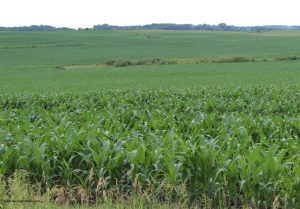A study by the Nature Conservancy, published in the journal Nature, shows that regulations and farming interventions that were supposed to help stop foodborne illness outbreaks caused by produce have instead caused a loss of ecosystem diversity in Salinas Valley without making produce safer. That California agriculture area called “California’s salad bowl” has voluntary standards that were put in place after the spinach E. coli outbreak in 2006. Many produce distributors are refusing to buy products from farmers who do not abide by these guidelines.
 The guidelines recommend that farmers clear land of native vegetation, put up fences and set poison to keep wildlife away from the fields. Some farmers are clearing swaths of land more than 100 yards long between farm fields and wildlife habitat.
The guidelines recommend that farmers clear land of native vegetation, put up fences and set poison to keep wildlife away from the fields. Some farmers are clearing swaths of land more than 100 yards long between farm fields and wildlife habitat.
Salinas Valley is a prime wetland and riverside habitat for migrating birds such as raptors and shorebirds and endangered species such as the steelhead salmon. Author Sasha Gennet said, “Farming practices for food safety that target wildlife are damaging valuable ecological systems despite low risk from these animals.” Uncultivated areas between farms and waterways are called “fallow strips” and are important for preserving ecosystems.
But those guidelines haven’t made our food safer. Since the guidelines have been put in place, eight E. coli outbreaks from produce have been reported from food grown in California. The study states that, “over a 5-year period following an outbreak of toxic Escherichia coli from spinach, a crop grown extensively in the region, 13.3% of remaining riparian habitat [the area between land and a river or stream] was eliminated or degraded. If these practices were implemented statewide, across all crops, up to 40% of riparian habitat and 45% of wetlands in some counties would be affected.”
The study’s authors recommend that managing farms for ecological health and food safety should be accomplished only through evidence-based, adaptive management approaches. Loss of biodiversity is not good for the ecological health of the planet.




